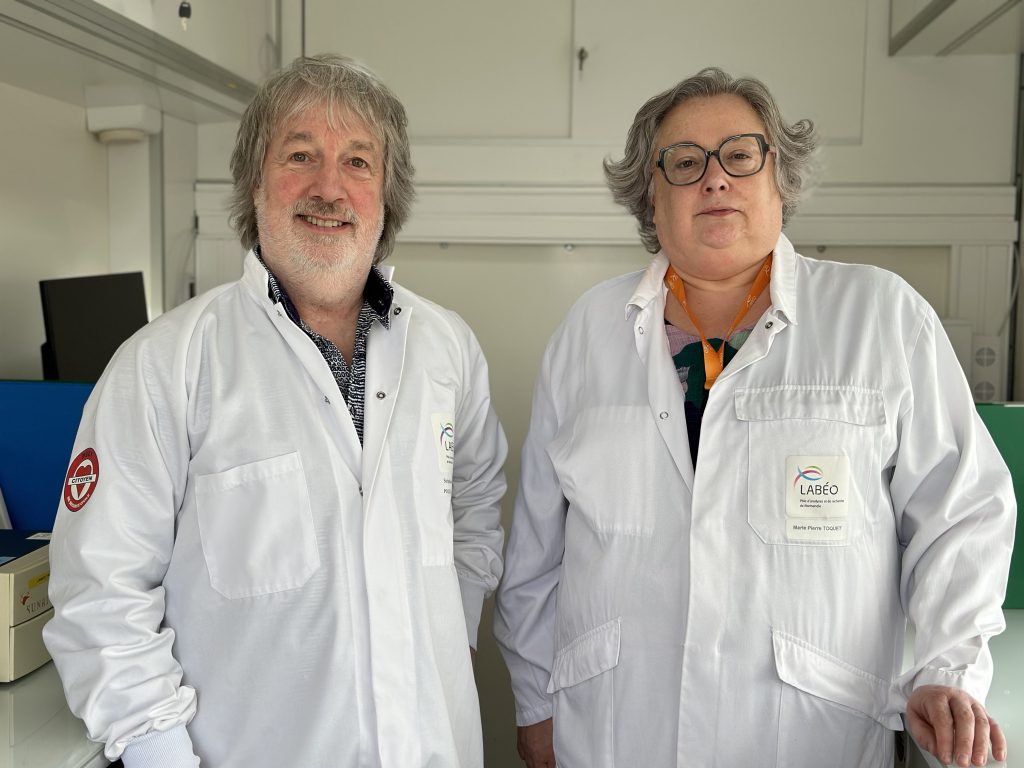CAEN, France–For years, laboratory testing for equine diseases has worked about the same way. Draw a sample, send it off to the lab, and in just a few days, depending upon the mail, you'll have your result.
But of course, in a world that has sped up to the point where a few days seems absolutely archaic, it wasn't going to be long until someone brought the lab to you.
Those people were LABEO, the Normandy Interdepartmental Analysis and Research Centre, whose new LABEO Truck was first deployed last year at the European Eventing Championships, and at this February's Arqana Sale. It's the first of its kind in Europe, and quite possibly the world.
With nearly 400 pharmacists, engineers, biologists, and more on staff, LABEO is one of the largest Public Interest Groups in France, processing approximately 1,250,000 samples and conducting research each year for 80,000 clients in France and abroad in the areas of animal health, water, and food products.
The truck not only looks like but is named after a food truck (and in case you're wondering what the French word for that is, it's `food truck,' said with a French accent.) The idea behind it is that in environments where you may be testing groups of horses whose proximity to one another could have serious health implications, it makes more sense to get the test results quickly, with the same precision of accuracy and standards as in the lab. The machines have been tested to ensure that even after driving over bumpy Norman roads, they maintain the same level of integrity as they do in the lab. “If we want to be credible, people have to know that if they call us, we will have the same level of service and we are the same people doing the analysis in the field as here in the lab,” said Pierre-Hugues Pitel, the head of the Health and R&D departments at LABEO.
To view a 3D model of the truck, click here.
The team at LABEO stresses that testing integrity. These aren't do-it-yourself rapid tests that you pick up at the pharmacy or at the vet. This is the entire laboratory, with its quality standards, brought to you, with the experts aboard to process and read the results, and to make recommendations.
Pitel emphasized the essence of detection time at the beginning of an outbreak. “Sometimes it's 12 hours to 20 hours to get results back, and in the case of an emergency at a track or big show jumping event, 24 hours just for delivery of samples is a bit long,” said Pitel. “So that was the first impetus for the truck, and the second was the EHV1 crisis in Valencia in February 2021.” That outbreak in Spain resulted in the death of 18 horses, and spread to horses in 10 countries. “We received 200 nasopharyngeal swabs back at the lab and we thought how much more efficient it would have been to do this in front of the show-jumping arena.”
Camille Vercken, well-known in the Thoroughbred industry as the former head of the Syndicat des Eleveurs in France and the owner and founder of the equine biosecurity company Equiways, is the head of LABEO's Equine Industry Business Unit. She said that the truck is fitted with solar panels on the roof so that it can truly be independent if it is called to an event where there is no power. Those panels power refrigerators, freezers, stoves, and heating implements along with computers. It is also equipped with WiFi.
“You could park the truck at a racetrack, and offer owners the opportunity to do a full assessment of a horse who under-performed,” said Vercken. “You can take the blood and have the results before he leaves the track that day.”
Stephane Pronost, one of the world's foremost virologists, is the Deputy Research Director for LABEO and a molecular biologist. He explained the importance of performing on-site Polymerase Chain Reaction or PCR tests. A simple test can detect a horse with a heavy viral load, but the PCR test can detect an early-stage virus by amplifying the DNA to study it in greater detail.
“I think today, it's very easy to explain what is PCR because of COVID,” said Pronost. “And it's exactly the same for horses, with a nasal swab. If there is an equestrian event and there is an alert with one of the horses, the practitioner or the owner can come to the truck and ask for virus detection, and we can give an answer after only two hours. It's one of the most important aspects of the truck-to go directly on the racetrack or to events and to be able to very quickly detect the presence of a pathogen.”
Pitel said there were three major aims for the truck. “First, prevention,” he said. “To ensure that horses who come to perform are safe. Second, an emergency. When there is a flu or EHV1 outbreak that begins, we can come and do emergency testing. And the third is if you are a stud manager and you would like to check all of the animals for flu, EHV, parasites, sending the truck makes it quicker and easier to do them all at once.”
Marie Pierre Toquet, a research assistant at LABEO, displayed a menu of the tests offered to clients, which looks much like one in a restaurant (or food truck), but includes fitness or inflammation assessments, tests for rhinopneumonia, influenza, strangles, EVA, piroplasmosis, EHV 1 2 and 4, and a complete parasitological assessment, all within two hours.
The purpose of the truck is not to do drug testing at the races or sales; that is handled by the French national lab.
Arqana had the truck on hand at this year's February Sale, and will offer it at sales going forward, said Arthur Serres, the sales company's technical director, who said that it was an extra layer of service that they can provide both the vendor and the buyer. “In 2024, it's a valuable service to be able to offer,” said Serres. “Horses move around a lot, and this is a comforting option to have for people on the sales grounds.”
Serres said that a typical usage at the sales could be post-sale testing before a horse leaves the grounds to make sure he's free of any pathogen before heading off to the new owner's stud farm. He also said that while Coggins tests were required before a horse arrives at the sale, from time to time there were problems with the vendors not having received the paperwork by the time they arrive.
“Right now, we ask for a quick test at LABEO, but going forward, with the truck, we can ask for the tests directly on the sales grounds and have the results in two hours. So we gain a lot of time and it's important because if not, the horse has to stay on the van or in another yard in Deauville and miss out on time when he could be being shown to potential buyers.”
Vercken points out that the on-site nature of the machine means that a collaboration between the farm manager, the vet, and the lab tech is possible, moving horses quickly into or out of quarantine or from one field to another as results are released. The same goes for horses about to be exported. It can also quickly detect and stop the spread of a larger outbreak at a training centre helping to save money by limiting scratches and keeping racing going.
The truck is cleaned and restocked before each use to ensure that the conditions inside are exactly like a lab, and it is small enough that anyone with a regular driver's licence can drive it. It was deliberately modeled after the food truck that LABEO workers see in their parking lot every day, but with a glass window instead of an open one to maintain the indoor temperatures and secure environment, while allowing transparency.
For LABEO, it also allows their employees some much-appreciated contact with their regular test subject-the horse-and seeing the economic effect that something like a piroplasmosis positive has on an auction price helps them to understand their work more fully.
“It's not why we built the truck, but it has been a secondary benefit,” said Pitel. “It gives meaning to their work.”
For inquiries regarding the LABEO truck, contact Camille Vercken at camille.vercken@laboratoire-labeo.fr.
The post The LABEO Truck: Mobile Veterinary Lab The First of Its Kind in Europe appeared first on TDN | Thoroughbred Daily News | Horse Racing News, Results and Video | Thoroughbred Breeding and Auctions.


